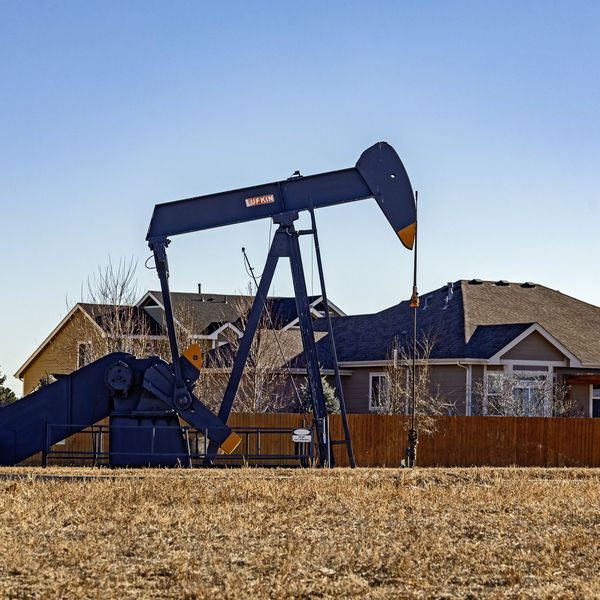Head of the US Environmental Protection Agency, Lisa Jackson, announced new Clean Air Act standards on Tuesday that will limit the ability, and likely halt, the construction of new coal power plants in the United States. The new rules place caps on the amount of carbon pollution new plants will be permitted to emit, and because so-called 'carbon capture' technology remains only a promise, there will be few coals plants that could meet the target.
The announcement was welcomed by environmental groups, though many cautioned that the rules suffer from large loopholes and do far too little to mitigate carbon emissions from existing power plants, especially the aging coal plants which are the worst offenders.
* * *
The Guardian's Suzanne Goldeberg reports:
The Obama administration effectively blocked the construction of any new coal-fired power plants on Tuesday, introducing rules to cut carbon dioxide emissions from the next generation of plants.
The proposed new standards would cut carbon dioxide emissions on new power plants in half and will, over time, help move America away from the carbon-heavy plants that currently produce nearly half of the country's electricity, Lisa Jackson, the head of the environmental protection agency, told a conference call with reporters.
"Right now there are no limits to the amount of carbon pollution that future power plants will be able to put into our skies - and the health and economic threats of a changing climate continue to grow," she said. "Today we're taking a common-sense step to reduce pollution in our air, protect the planet for our children, and move us into a new era of American energy."
And:
Coal-fired power plants are the largest single source of carbon dioxide, a main driver of climate change. But their share of America's energy mix has been shrinking, falling below 40% last year, according to the energy information agency.
The proposed new rules will make it nearly impossible to build new coal power plants, unless they are outfitted with carbon capture and storage systems, a technology is still not in use on a commercial scale.
Coal plants will be given decades to meet the new standards.
The new rules will not apply to existing coal-fired plants, or plants due to go into operation this year. Jackson told reporters they would affect about 15 new coal power projects, currently in the planning phases.
* * *
Center for Biological Diversity: Standards Make Important Strides in Cutting Future Pollution But Leave Existing Polluters Without Limits
"Today's rule makes important strides in reducing carbon pollution from future power plants, but unfortunately gives existing polluters a free pass," said Kassie Siegel, director of the Center for Biological Diversity's Climate Law Institute. "While the long-delayed release of this critically important pollution reduction rule is welcome, it should be strengthened."
Today's announcement comes on the heels of a warning by scientists on Monday that this decade will be critical for reducing greenhouse gas emissions in order to avoid tipping points that will make the world irreversibly hotter. The disastrous effects of climate change are already setting in, as evidenced by recent floods, heat waves, melting sea ice, wildfires and epic drought -- all of which are affecting people and wildlife around the globe.
"If we're going to avert a climate catastrophe, the response must match the magnitude of the crisis we face. Today's rule is an important step forward, but much more is needed," Siegel said.
* * *
Greenpeace USA: The new greenhouse gas rules issued by the Environmental Protection Agency today are welcome, but disappointing
"Administrator Lisa Jackson and Gina McCarthy are climate heroes for moving forward despite a begrudging White House and a Congress mired by a radical right wing in love with coal and oil," says Greenpeace Climate Campaigner Kyle Ash.
The decision comes as members of the Utility Air Regulatory Group (UARG) - including Duke Energy, Dominion Energy, and Southern Company - fight tooth and nail against basic environmental protections and the basic idea that climate pollution endangers Americans. "The UARG does not care about communities who will lose their homes from rising sea levels, more frequent wildfires, and freak storms - all caused by climate disruption."
"Unfortunately, this standard is riddled with weaknesses, like exemptions for biomass and carbon capture and storage, and it does nothing to drive down current climate pollution," Mr Ash says.
Three huge loopholes seriously undermine this pollution standard. First, the EPA has again exempted pollution from burning biomass. Biomass can have higher climate emissions than coal, while the resilience of American forests is doubly compromised by rising temperatures. Second, the EPA has offered a one year free-for-all so industry can scramble to get coal plants approved and avoid any limits. Third, the EPA allows new coal plants to pollute freely for ten years as long as they integrate carbon capture and storage technology (CCS) and lower emissions enough to bring their annual average pollution down to the limit after 30 years. The EPA, in effect, has defined an exemption based on unproven technology that even in theory would sequester carbon while exacerbating other catastrophic coal issues - such as mountaintop removal and generating millions of tons of toxic coal ash.
In 2007 the Supreme Court required the EPA develop climate pollution standards, a decision industry polluters continue to fight. Although this standard is anti-climactic since it only limits emissions from power plants not yet built, old coal continues to fight a market that has clearly realized coal power is dirty, old, and expensive.
While the new rule may help keep new giant sources of emissions from coming online, the Obama administration has yet to require limits on carbon pollution from existing stationary sources. "The President should stand by Administrator Jackson and her team as they push corporate polluters to reduce the CO2 spewing from smokestacks today," Mr Ash says.
# # #




